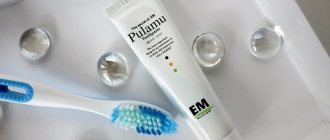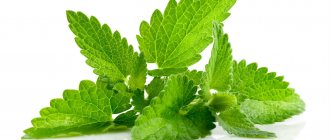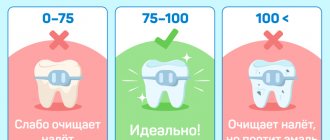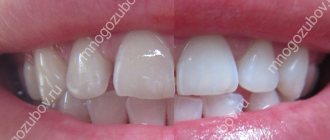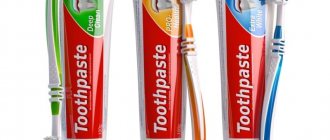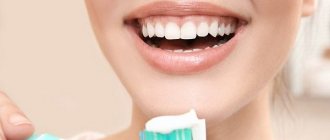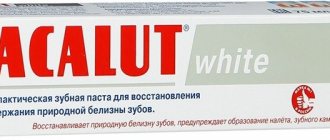Content
hide
1 What toothpastes do dentists recommend? 1.1 Main components of hygienic pastes
1.2 The main types of therapeutic and prophylactic toothpastes, depending on their action: 1.2.1 Toothpastes that strengthen tooth enamel:
1.2.2 Toothpastes for gums.
1.2.3 Pastes for sensitive teeth.
Any dentist will tell you that toothpaste is not as important as a toothbrush and proper brushing technique. You can brush your teeth well without toothpaste at all. However, pastes have an additional positive effect on teeth - and what kind of effect depends on their composition. Let's take a closer look.
As you know, in order for your teeth not to be affected by caries and your gums not to become inflamed, you need to brush your teeth every day - regularly and thoroughly, so that food residues do not linger on the surface of the teeth and plaque with microbes does not have time to form.
All toothpastes are divided into hygienic (which simply help to clean teeth better) and therapeutic and prophylactic (which contain various medicinal substances that help solve certain problems).
In the beginning there was sand and chalk
Toothpaste and brush are everyday things with which our day begins and ends. However, they were once a real luxury. The ancient Egyptians were the first to think about oral hygiene and began to use sand, ash, ground stones and animal horns as a cleaning agent, and their own finger replaced the brush. In the 4th century BC. The great healer Hippocrates recommended using mixtures of pumice with the addition of wine vinegar, which are more gentle on tooth enamel, to prevent dental diseases. At the end of the 18th century, little had changed. For example, the British brushed their teeth with powders that included crushed brick, crushed bark and coal chips.
The prototype of modern toothpaste was invented by Americans in the 19th century. This time there were no stones or ash. Teeth cleaning products were a mixture of chalk powder, neutral soap and aromatic additives. It was only in 1873 that Colgate released the first toothpaste in glass jars, which replaced tubes two decades later. They were invented by dentist Washington Sheffield of New London. But Colgate beat the inventor by quickly registering a patent for itself. An interesting fact is that in Russia, most people at that time continued to brush their teeth with chalk-based powder, and only in the 50s it became possible to buy a familiar tube of toothpaste in stores.
The best pastes, according to dentists
There is also a better toothpaste, according to dentists, the rating is presented below.
Lakalut
It ranks first in the ranking. The paste is antibacterial and can be used for both prevention and treatment purposes. Contains lactic acid, which allows you to achieve an anti-inflammatory effect.
Splat Lavandasept
In the control purchase category, the pasta took first place. Most dentists believe that it is beneficial for the gums, especially if they are sensitive, and has anti-inflammatory and antibacterial effects.
Effective toothpaste
Despite the fact that the composition contains whitening components, their effect is gentle, thanks to this it is possible to maintain the integrity of the dental coating. The cost of the product is high, but the result lives up to expectations.
Rocks
It ranks second in the top quality brands, the results were confirmed by a test purchase. It contains ingredients of natural origin, so the paste is the safest and many people prefer it.
The products manufactured by this company are of high quality. Vitamin E is also present in the composition; it preserves the integrity of tooth enamel.
Apadent
Paste recommended by many dentists
The best toothpaste with a healing effect. Containing nano-hydraxyapatite, the substance strengthens tooth enamel and prevents its destruction.
Numerous studies confirm the fact that in addition to its therapeutic effect, the paste has a filling effect and relieves the inflammatory process. Recommended for use in case of periodontal disease.
Best toothpaste
Which toothpaste is better? Definitely one that meets a person’s needs and suits his indications. Until recently, the main task of toothpaste was to help the brush clean teeth from plaque. Today, modern manufacturers of hygiene products have expanded its functionality and began to offer special medicinal toothpastes, both complex and for targeted solutions to specific problems. Today you can find tubes not only for the prevention of caries, but also for bleeding gums, against the formation of tartar, paste for implants or smoker’s plaque, for fresh breath or restoring the pH balance of the oral cavity, as well as for much more. But, in fact, all pastes are divided into several varieties, which we will consider.
Frequently asked questions to the doctor
The best way to brush your teeth
Hello, I would like to know what is better tooth powder or toothpaste?
There is no universal product that could suit everyone. Compared to toothpaste, powder can be chosen based on the following points:
- It is more effective to remove tartar, plaque and other contaminants with a dry hygiene product. Even if the bristles of the brush are soft, the product will still cope with its task.
- Tooth powder not only whitens teeth, but also polishes them. After a few cleanings, you can notice the first result; you won’t be able to achieve this effect with paste.
- The powder strengthens tooth enamel and improves the condition of gums.
- Using the powder, you can normalize the acid-base balance in the oral cavity.
Thus, we can conclude that in many respects tooth powder is superior to toothpaste.
What helps with tartar?
Is it possible to find out which remedy is best for tartar?
The best remedy, according to many dentists, with which you can soften the stone is Belagel-R. It is used for preventive purposes, just apply the product to your teeth for a few minutes, then rinse your mouth and clean.
Which pasta is better?
Tell me, what is the best Russian toothpaste or is it better to give preference to foreign ones?
The best toothpaste made in our country is New Pearl Fluoride. It has a good whitening effect, refreshes the oral cavity, and contains a lot of calcium. The product cost is low. The only drawback that can be highlighted is that some people experience an allergic reaction after use.
Pastes for the prevention of dental caries
Toothpastes for the prevention of caries are recommended for increased susceptibility to the formation of caries bacteria, as well as as restorative therapy after teeth whitening. They saturate dental tissues with useful minerals, prevent the growth of carious bacteria, and also fight the formation of plaque. To strengthen teeth, fluoride compounds are added to such pastes. It is contained in such pastes as “Day and Night” Swiss Smile, Enzycal 950 CURAPROX, Mirafluor C Miradent, “Power of a Smile” Jason and others. Fluorine is an important microelement, since it is the one that participates in the metabolism of calcium, and, therefore, ensures its presence in the enamel. But it is worth remembering that it is extremely toxic, so its amount entering the body should not exceed the established norm. People living in areas with fluoride-saturated water (more than 1.2 mg/l) are advised to use fluoride-free toothpaste. You can find out about the fluoride content in the water in your area by calling the nearest Sanitary and Epidemiological Station.
Toothpaste
Theodent Classic
Fluoride-containing pastes
Such pastes are enriched with fluoride in the form of sodium fluoride, aminofluoride or monofluorophosphate in various concentrations. The designation of fluoride concentration on the packaging can be seen as the abbreviation “ppm” (parts per million). For adults, this value should not be higher than 1500 ppm. Fluoride-containing toothpaste should not be swallowed, so it should not be used on children who cannot spit and rinse their mouths.
Fluoride is effective in preventing the development of caries, but it should only be used in areas where low fluoride levels in the water have been confirmed. Residents of areas with sufficient fluoride levels should not use fluoride toothpastes. If you neglect this rule, due to an excess of the element in the body, dental fluorosis will develop - a violation of the pigmentation and structure of tooth enamel.
Pastes against tooth sensitivity
There are special toothpastes for sensitive teeth. They contain potassium chloride, potassium citrate (Twin Lotus Recipe for Sensitive Teeth, Mirasensitive hap+) or strontium chloride. These substances “clog” the dentinal tubules and reduce hyperesthesia. They also saturate the tooth enamel with minerals, the deficiency of which is most often the cause of increased sensitivity of enamel and dentin. But the most progressive substance today is considered to be hydroxyapatite (Sensitivity Control Biorepair). Its crystals are similar in composition to tooth enamel, so they effectively combine with it, restoring the natural protection of teeth. Pastes for sensitive teeth should not contain a drop of chemical bleaches and, instead of coarse calcium carbonate, should contain gentle abrasive substances with a smaller particle diameter, for example, silicon oxide. Such pastes are recommended for hypersensitive teeth, as well as for use during and/or after teeth whitening procedures.
Sensitivity Control Biorepair toothpaste
Therapeutic pastes for tartar
Hard plaque can be completely removed only by professional ultrasonic cleaning or using a special Air Flow device. Toothpastes are used more as a preventive measure; they can lighten pigmented areas and remove small plaques.
Such products are recommended for tea and coffee lovers and, of course, smokers. Typically anti-tartar pastes contain:
- a small amount of fluorine (0.1 - 0.6%);
- antiseptics;
- minimal amount of sodium lauryl sulfate.
These products are highly abrasive - the RDA index is above 100. It must be remembered that abrasives increase the permeability of enamel. This means that you will need to increase your care: use floss and rinses.
Pastes for strengthening gums
Toothpastes aimed at preventing and reducing periodontal inflammatory processes reduce bleeding gums, help strengthen them, have an astringent effect, and also destroy harmful microbes. They most often contain antibacterial substances, for example with chlorhexidine, as in Curaprox ADS 712 paste, together with plant extracts that have an anti-inflammatory effect, such as edelweiss and echinacea in the SWISS SMILE vitamin herbal paste or witch hazel and calendula in the Plus Parodontgel BioRepair paste. Some of them also contain chlorophyll and vitamin E. All of these substances have a beneficial effect on gum tissue, accelerating the healing process and the formation of new cells. Such pastes are recommended for diseases of stomatitis, gingivitis and periodontitis.
Toothpaste Curasept ADS 712 CURAPROX
Pastes "Asepta"
The Asepta series has a wide selection of medicinal pastes that help solve various problems:
- ASEPTA ACTIVE provides teeth with comprehensive protection, helps reduce the number of pathogenic microbes and eliminate inflammatory processes in the oral cavity.
- ASEPTA SENSITIVE reduces tooth sensitivity and treats gums.
- "ASEPTA PLUS" REMINERALIZATION restores thinned enamel and protects gums from inflammation.
Regular use of Asepta products can reduce bleeding gums and improve dental health.
Pastes against bad breath
The action of toothpastes that help fight halitosis is aimed at restoring the normal balance of oral microflora, the disruption of which is usually accompanied by excessive proliferation of anaerobes. These substances emit volatile sulfur-containing products that have a pungent odor. Anti-bad breath pastes contain components that suppress pathogenic microflora and act on viruses. In addition, such pastes eliminate dry mouth syndrome, which can also cause halitosis. Antihalitic hygiene products are recommended for bad breath caused by microflora disturbances and dry mouth.
Enzymatic toothpaste gel
Jason Enzyme Brightening
To summarize: what criteria should you use to choose a toothpaste?
In addition to the above classification parameters, toothpastes also differ according to the category of users for which they are intended. Moreover, the division occurs not just “for adults and for children,” but also taking into account different periods of growing up (puberty), changes in health (pregnancy), etc. Specialists at the Amel Dental dental clinic recommend that before you buy toothpaste, make an appointment make an appointment with a dental hygienist or your own dental therapist and receive professional recommendations based on the actual condition of the teeth and mucous tissues, and individual characteristics. Only a specialist can choose the right toothpaste, especially for patients with certain dental problems.
Knowing which type of paste suits you best, you can choose the right product. When choosing, you should also take into account the general parameters of toothpastes:
- composition (absence of harmful substances, allergens, components that can cause irritation of the mucous membrane);
- abrasiveness of toothpaste;
- deodorizing properties and duration of fresh breath effect;
- individual preferences (for example, for people who cannot tolerate the menthol aroma, an odorless and tasteless paste is ideal).
Composition of toothpaste - which is better?
A dental hygienist can help you figure out which toothpaste is best for specific oral problems. When purchasing a product yourself, you need to pay attention to whether it contains substances potentially harmful to teeth. For example, coarse abrasive substances that negatively affect tooth enamel. These may be chalk or calcium carbonate, as well as aluminum oxides, which are prohibited in some countries. Nowadays, silicon dioxide is considered the best abrasive; it gently removes all dental plaque without having a negative effect on the enamel and gums. You can also find other safe abrasive substances in paste compositions—dicalcium phosphate or sodium metaphosphate.
You should be careful with toothpastes that contain triclosan or chlorhexidine. Brushing with such pastes may be necessary to treat inflammation in the gums or to eliminate bad breath. However, long-term use (more than 3 weeks) of paste with antibacterial substances can lead to disruption of the beneficial microflora of the oral cavity. If sodium lauryl sulfate is in one of the first places in the description of the composition (that is, its percentage is large), then it is also better not to buy such a paste. The fact is that this surfactant is responsible for foaming, but does not in any way affect the quality of cleaning. In addition, it has long been proven that even in small doses, sodium lauryl sulfate can negatively affect the body. This component is contained in all pastes from Blend-a-med, Colgate, Oral-B, Aquafresh, Karimed, Forest Balsam, some pastes from Lacalut, SPLAT, PresiDENT, and New Pearl.
Therapeutic pastes for bleeding gums
These products contain extracts of various medicinal plants. They soothe sore gums, relieve swelling, reduce bleeding when brushing, and eliminate itching, bluishness and redness. In addition, these pastes relieve pain. They can be used in the treatment of periodontitis or gingivitis. But we must remember that in case of serious diseases, pastes are effective only with dental treatment.
In the absence of serious measures, such pastes can temporarily hide the symptoms, but, unfortunately, they will not cure the disease.
How much does toothpaste cost and where to buy it?
The price of toothpaste varies from 50 to 1,000 rubles per tube, and sometimes can exceed this threshold. Some people think that expensive pastes are the best, others don’t see the difference in all the variety and buy the cheapest one. In both cases, the buyers are wrong. A high price does not always indicate the quality of a product, and buying cheap pastes is simply dangerous - they may turn out to be a fake or a product not manufactured in accordance with GOST. Where to buy toothpaste? This is best done in pharmacies and specialized stores, such as Startsmile Shop. You should not buy pasta in underground passages, at the market, on the train, or from “distributors.”
The choice of toothpaste determines many things - the appearance of teeth and gums, the condition of the enamel and its saturation with essential microelements. However, even the best toothpaste is not able to protect teeth from caries and gums from inflammation if cleaning is carried out quickly, poorly, incorrectly and irregularly.
Pastes with whitening effect
Many manufacturers of whitening toothpastes are disingenuous when they call them whitening; it would be more correct to call them “brightening” or “with an increased cleansing effect.” Lightening of enamel in pastes occurs by removing plaque and returning the natural color to the teeth. True enamel whitening can only be done in the dentist's office.
Removal of plaque using this group of products occurs due to increased abrasiveness; a tube of paste with a truly cleansing effect should contain information about the abrasiveness index. It is designated by the letters RDA; the higher the digital value of the index, the larger the grinding particles. RDA index values:
- 30-50 – non-abrasive paste, suitable for cleaning sensitive teeth;
- 50-80 – low abrasive, can be used by children over 14 years of age;
- 80-100 – moderately abrasive, used by adults daily;
- 100-200 – high abrasiveness of the paste, teeth are brushed 1-2 times a week, sometimes less often; It is advisable to consult a dentist before use.
The recommended abrasiveness for daily use is RDA 70-80, but you need to focus on the condition of your teeth and gums.
There are pastes in which the enamel is cleansed not through abrasive particles, but through the action of the enzymes papain and bromelain. Enzymes enter into a chemical reaction with plaque, gradually dissolving it.
If the packaging of a whitening toothpaste does not contain information about the RDA index or does not contain enzymes, it is unlikely that this product will be able to lighten tooth enamel.
What kind of toothbrush should you have?
First recommendation. A toothbrush must have synthetic bristles . Nowadays it is important to be eco-friendly, but this is not the case when you should give preference to natural things. Any natural fiber (be it boar bristles or bamboo) has a porous structure, and inside it there is a channel that quickly fills with bacteria from dental plaque. There is no way you can clean the plaque from inside such bristles, so after the first uses, your eco-friendly toothbrush becomes a breeding ground for microorganisms.
Dental brushes
If you have gaps between your teeth or your teeth are slightly diverging due to the initial stage of periodontal disease, then be sure to use brushes .
The brush needs to be selected according to the size of the gap between the teeth - so that it fits tightly into the gap. TePe has them ) and empirically choose the one that suits you.
For the convenience of patients, brushes with long handles are produced so that they can clean the spaces between the far teeth.
Important: the brush should be changed every 1-2 weeks as it wears out.
Dental brushes
Pastes for treatment and prevention
Pastes belonging to this category of products cannot be used without the recommendation of the attending physician, as they contain potent components in high concentrations that can harm dental health and even cause intoxication of the body.
Home therapy for superficial caries
The most popular category of therapeutic and prophylactic toothpastes are products with an anti-caries effect. They contain antibacterial components - such as triclosan - and chlorine-based organic compounds.
Colgate toothpaste “Elmex – protection against caries”
Anti-caries pastes have many advantages:
- destroy most strains of known representatives of pathogenic flora (streptococcus, staphylococcus, chlamydia, trichomonas);
- provide disinfection of the oral cavity;
- reduce the severity of inflammatory processes by neutralizing pathogenic flora;
- contain antiseptics, which can be part of combined treatment regimens for the treatment of infectious diseases (including purulent-inflammatory processes).
Toothpaste “SPLAT Biocalcium”
Pastes intended to protect against caries and treat bacterial infections of the oral cavity should not be used for long periods of time. The active components that provide a therapeutic effect affect not only pathogenic microorganisms - the composition of beneficial microflora also changes qualitatively. Long-term use of pastes with bactericidal and antiseptic effects is one of the common causes of stomatitis, which develops as a result of a decrease in local immunity of the mucous membranes. The course of use of anti-caries toothpastes recommended by dentists is no more than three weeks.
- Rating of tooth whitening pastes
Promise toothpaste
Important! The antibacterial and antimicrobial effect is achieved by adding fluoride and calcium (in a bioavailable form) to the paste. If the packaging contains information that the toothpaste contains more than 500 ppm of fluoride, it should not be used by children under 6 years of age.
Superficial caries
Pastes based on salt compounds and soda
These pastes are used for the treatment of various infectious processes, mainly of an inflammatory nature. The main indication for the use of pastes in this category is bacterial, aphthous and fungal stomatitis, as well as various inflammatory processes in the gums and periodontal tissues.
LG Perioe Bamboo Salt Gumcare Toothpaste
Salt and soda pastes have a beneficial effect on the oral cavity:
- normalize blood circulation and mineral metabolism in the gums;
- improve the outflow of exudate from inflamed tissues;
- restore the natural level of acidity and protect tooth enamel from external factors;
- remove the components that make up dental deposits.
Sea salt toothpaste
The high salt content in specialized salt pastes has a moderate analgesic effect and helps relieve pain in periodontitis, periodontal disease, gingivitis and other inflammatory diseases of the oral cavity.
Toothpastes
Teeth whitening and removal of plaque on the enamel surface
For these purposes, pastes with a high content of abrasives - solid particles with cleaning properties - are used. Such pastes effectively remove dirt and plaque (including hard dental deposits), polish the surface of enamel and filling material, and make teeth smooth.
SPLAT Whitening plus
One of the main abrasive materials used in the production of whitening pastes is chalk. It is an organic material, most of which is calcium. Chalk is low cost, has good hygienic properties and can be used for regular cleaning of tooth enamel.
Whitening toothpastes
At the same time, the chalk base also has significant disadvantages, for example:
- high level of trauma to the enamel coating with frequent use;
- premature abrasion of enamel and development of hyperesthesia;
- interaction with various groups of fluorides, leading to the formation of insoluble fluorides, which cause a decrease in the concentration of active fluorine and a decrease in the antibacterial and anti-caries properties of the product.
Toothpaste “New Pearl – Whitening”
The most effective abrasive elements are considered to be silicon hydroxide and sodium and potassium phosphates. They gently dissolve bacterial plaque and remove it from the surface of the teeth. Such pastes are recommended for smokers and people whose diet often contains foods and drinks with a high content of coloring pigments (carrots, coffee, berries, strong brewed tea, carbonated drinks).
Important! For the purpose of teeth whitening, products with high abrasive properties can be used in the form of pastes based on hydrogen peroxide or carbamide peroxide. They need to be distinguished from professional whitening systems (for example, Rembrandt, DentalWhite). The content of peroxide and other active ingredients in such products can be 30 times higher compared to preventive toothpastes, so they can only be used as prescribed by a dentist if there are strict indications.
Snow-white smile
Anti-inflammatory rulers
Pastes to reduce inflammatory processes are the most extensive group of products intended for therapeutic and preventive purposes. They may contain various antimicrobial and anti-inflammatory components, antiseptics, and plant extracts. Depending on the reasons that caused the inflammation, the doctor may prescribe drugs of this category, which will contain certain active ingredients.
Toothpaste Lacalut Aktiv
Table. Classification of anti-inflammatory pastes according to active substance.
- Black toothpaste
| Funds group | What's included |
| Pastes based on aluminum lactate | Lactic acid salts. |
| Antimicrobial and bactericidal pastes | Chlorhexidine and hexeditine (antiseptics), biosol (substance with bactericidal and disinfectant effects), triclosan (antimicrobial component). |
| Herbal pastes and products based on biologically active components | Extracts and extracts of medicinal herbs (chamomile, sage, St. John's wort, calendula, calamus), oak bark, birch bud extract, aloe, propolis, etc. |
Some anti-inflammatory toothpastes may contain special enzymes or chlorophyll found in green plants. Chlorophyll has a pronounced antiseptic effect, helps stop inflammatory processes and reduce bleeding gums. The use of pastes with chlorophyll helps improve the functional condition of soft tissues and protect the gums from loosening.
Forest balm
Hyperesthesia of tooth enamel: treatment and prevention
Almost 40% of patients who come to see a dentist experience increased tooth sensitivity. In most cases, the pathology is associated with active demineralization of tooth enamel, therefore, to strengthen the enamel coating and eliminate painful reactions upon contact with irritants, the doctor may prescribe toothpaste with a high fluoride content. Such agents are called desensitizing agents and are prescribed only by a dentist or hygienist.
Enamel hyperesthesia
The action of these pastes is based on the following therapeutic properties:
- restoration of mineral balance in the hard tissues of the tooth;
- reducing the severity of pain;
- creating a protective film that prevents enamel irritation.
You can use toothpastes for hypersensitivity in long courses lasting 1-2 months, but after this period you need to take a break.
At the dentist
Clinical researches
The effectiveness of Asept toothpastes has been clinically proven:
- it has been proven that regular use of preventive toothpaste ASEPTA ACTIVE for a month can reduce bleeding gums by 60%, improve the overall condition of the oral cavity by 44% and reduce inflammation by 33%;
- It has been confirmed that regular use of preventive toothpaste ASEPTA SENSITIVE for a month can reduce bleeding gums by 62%, reduce the sensitivity of teeth and gums by 48% and reduce inflammation by 66%.
- It has been proven that regular use of professional toothpaste ASEPTA REMINERALIZATION after 4 weeks improved the condition of the enamel by 64% and reduced tooth sensitivity by 66%.
Sources:
- Clinical and laboratory assessment of the influence of domestic therapeutic and prophylactic toothpaste based on plant extracts on the condition of the oral cavity in patients with simple marginal gingivitis. Doctor of Medical Sciences, Professor Elovikova T.M.1, Candidate of Chemical Sciences, Associate Professor Ermishina E.Yu. 2, Doctor of Technical Sciences Associate Professor Belokonova N.A. 2 Department of Therapeutic Dentistry USMU1, Department of General Chemistry USMU2
- Clinical studies of antisensitive toothpaste “Asepta Sensitive” (A.A. Leontyev, O.V. Kalinina, S.B. Ulitovsky) A.A. LEONTIEV, dentist O.V. KALININA, dentist S.B. ULITOVSKY, Doctor of Medical Sciences, Prof. Department of Therapeutic Dentistry, St. Petersburg State Medical University named after. acad. I.P. Pavlova
- Report on the determination/confirmation of the preventive properties of personal oral hygiene products “ASEPTA PLUS” Remineralization doctor-researcher A.A. Leontyev, head Department of Preventive Dentistry, Doctor of Medical Sciences, Professor S.B. Ulitovsky First St. Petersburg State Medical University named after. acad. I.P. Pavlova, Department of Preventive Dentistry
Which pasta should I buy?
All products from the category of professional, therapeutic or preventive toothpastes should be prescribed only by a dentist based on a visual examination and the results of a diagnostic examination. The scheme of use and duration of the course are also determined by a specialist.
Table. Which pasta should I buy?
| Purpose of use | What pasta to buy |
| Daily hygiene and oral care, breath freshening. | “Artek”, “Family”, Vita. |
| Strengthening tooth enamel and correcting mineral balance. | "Pearls", "Arbat". |
| Treatment of infectious and inflammatory diseases of the oral cavity (for example, stomatitis, periodontitis, etc.) | “Balsam”, “Pomorin”, “Amodent”, “Boroglycerin”. |
| Restoring normal acidity levels using soda toothpastes. | “Dental”, “Mildfresh”, “Aquafresh soda”, “Colgate soda”. |
| Treatment of hyperesthesia of tooth enamel. | "Sensodyne", "Elgifluor", "Biodent sensitive". |
| Teeth whitening, dissolution of dental plaque. | “Aquafresh whitening”, “Colgate active oxygen”. |
Choosing a toothpaste
If there is a pronounced putrid odor from the mouth, the doctor may prescribe products that contain sorbing elements. They effectively bind and remove pathogenic bacteria and their metabolic products, which can be one of the causes of unpleasant odor. It should be noted that the use of this category of pastes is justified only after excluding diseases of the digestive system - gastritis, pancreatitis, etc.
- What happens if you eat toothpaste?
How not to make a mistake when choosing toothpaste
Despite the wide variety of toothpastes, choosing the right product without the help of a specialist is not easy. To choose the right hygiene products, you need to know the types of pastes and their differences, as well as have an idea of the properties of the main ingredients used in the production of pastes of various groups. It is best to entrust the selection of hygiene and prevention products to a dentist, who will prescribe a toothpaste that meets the needs of a particular patient. How many minutes you need to brush your teeth, read on our website.



